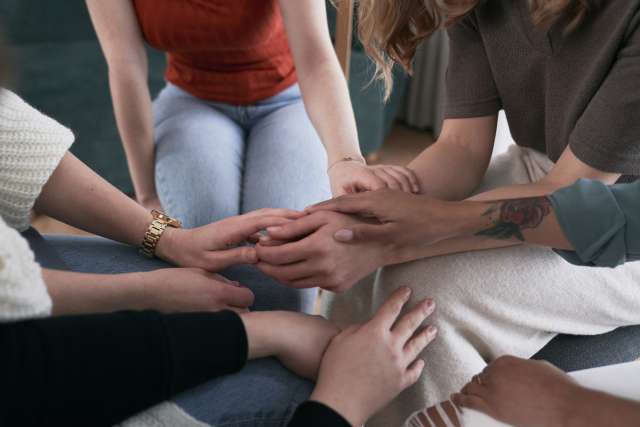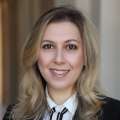Spending a year of her psychology doctoral studies as an intern with the Simms/Mann UCLA Center for Integrative Oncology has been transformative for Nehchal Kaur, giving her confidence and clarity about the kind of clinician she’ll be after graduation.
“I want to be them when I grow up,” Kaur says of her Simms/Mann Center colleagues, noting their openness, warmth and cultural sensitivity. “I remember meeting them and thinking, ‘Wow, this is how I want to be. This is how I want to carry myself.’”
Kaur is one of three graduate trainees (chosen from scores of applicants) at the Simms/Mann Center this year. For more than a decade, the center has offered advanced clinical training to graduate students in psychology and social work, providing them the opportunity to conduct individual and group therapy sessions, counsel patients receiving chemotherapy infusions, consult with physicians and nurses in community clinics and offer support to patients’ family members.
“It’s a really robust approach to training,” says Valentina Ogaryan, PhD, training director for the Simms/Mann Center and a former graduate intern herself. “They really learn appropriately and effectively how to function in the role of a mental health professional in a medical setting.”
As the center’s most recent cohort of interns — including Kaur — prepare to wrap up their training in April, they reflected on their experiences working in one of the nation’s only integrative, psychosocial oncology organizations in academic medicine.
Integrating the spiritual into mental health care
A fourth-year PsyD student at Loma Linda University, Kaur knew early in her academic journey that she wanted to spend a practicum year with the Simms/Mann Center.
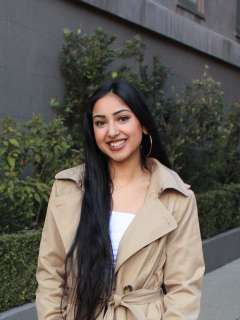
“I knew psychosocial support, emotional support deserves a seat at the medical table,” she says, “and I wanted that chair.”
However, few sites offer the kind of integrated psychosocial support the Simms/Mann Center does, where mental health care is part of the overall treatment plan for patients with a cancer diagnosis.
“This was such a rare opportunity,” Kaur says.
As an intern, Kaur has been integrated into medical teams caring for people with cancer at UCLA Health clinics and hospitals. She’s been able to put her psychology training into practice in a range of settings, and broaden the breadth of her work to include more spiritually oriented care for interested patients.
A highlight of her internship was working alongside a Simms/Mann Center chaplain and seeing patients receive that kind of support, she says, which was both eye-opening and heart-opening.
“I have received a lot of education learning about the mind, body and spirit, but it was my experiences here at Simms/Mann that helped me put into practice what it means to also offer support for the soul — what it means to put those pieces together,” Kaur says. “Being on a multidisciplinary team where spiritual support also has a seat at the table has really allowed me to bring that into health care, which is incredible. Each person has their own unique fingerprint of mind, body and spirit. I’m going to take that integration with me as I go forward.”
Having an opportunity to practice this kind of whole-person approach to each patient’s well-being has been liberating, she says.
“Sometimes when things are more clinical, it can be really hard to find your own voice,” Kaur says. “So through this year, through taking that more humanistic, holistic approach, I’ve also gotten to be more of my authentic self as a clinician. And that is invaluable.”
Growing as a clinician
Rachel Gonzalez, a dual master’s student in public health and social work at UCLA, says she’s become an unofficial ambassador for the Simms/Mann Center among her classmates because of its unique approach to mental health care.
Her training experience has helped her grow as a clinician, she says, both in terms of who she can help and how she goes about it.
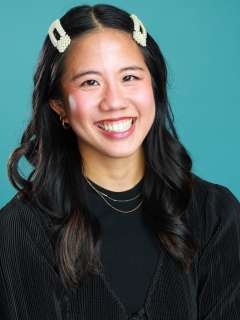
“Something that Simms/Mann makes very clear is that cancer totally upends someone’s life and can impact their family, their career, literally everything,” Gonzalez says. “So I do feel like I’ve been able to get such a diverse set of experiences working with different patients, because they all have different issues surrounding their cancer.”
Like Kaur, Gonzalez also appreciated including spirituality in her approach and the center’s commitment to providing culturally congruent care.
“Being a woman of color and an immigrant, there’s so many aspects of Western medicine that, when you try to apply it to our culture, it just doesn’t work,” says Gonzalez, who is Asian-American. “The integration of not only different types of medicine, but how physical health is connected with spirituality and faith was also a big reason why I wanted to intern at Simms/Mann.”
For many of Gonzalez’s patients, receiving psychosocial support at the Simms/Mann Center is their first encounter with mental health services of any kind, she says, which is “nice but also a little bit of pressure.”
“It’s a privilege to be with patients in this space,” she says. “And oftentimes it does encourage them to go seek out a therapist more long term.”
With her graduation coming up in spring of 2024, Gonzalez hopes to stay “in this happy in-between of health and mental health.”
“I want to work in a similar setting as Simms/Mann, whether that be a medical-adjacent center or completely within a health care system,” she says. “But it’s kind of hard to find a center that’s as comprehensive as Simms/Mann is.”
A blueprint for the future
Like her fellow trainees, Lauren Mead, a fifth-year doctoral candidate, knew early in her graduate studies at the California School of Professional Psychology that she wanted to train at the Simms/Mann Center.
The opportunity to be part of a multidisciplinary medical team was a major draw, as was the chance to work with patients of all ages and backgrounds.
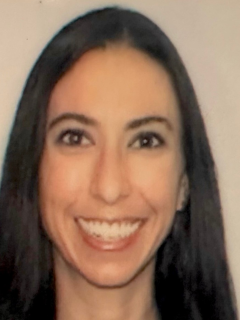
Mead opted for two years of training with the Simms/Mann Center. During that time, she’s been able to learn from physicians, psychologists and counselors with different specialties; offer didactic workshops to colleagues within the center and more broadly at UCLA Health; counsel patients in various settings on a range of issues; and visualize the kind of career she wants to create.
Mead says her dream is to open an integrative pain management center that brings together a diverse group of providers — physicians, psychologists, social workers, physical therapists, acupuncturists and chiropractors — who collaborate to help patients. Working with the Simms/Mann Center “has definitely helped me to really understand the environment I want to create within that practice and the ways I want to emulate listening to my fellow clinicians,” she says.
There’s a warmth and collegiality among providers at the Simms/Mann Center that fosters growth, learning and professional confidence, Mead says.
“Being in this setting where everybody is so willing to celebrate each other and lift each other up really makes you feel like you can be the clinician you want to be, and already are. Doing this work has really helped to bolster my own sense of self as a person and a professional,” she says. “I think my level of confidence is maybe a little higher than some of my peers who might not have had such a wonderful place to grow and really figure out who they are as a clinician.”

